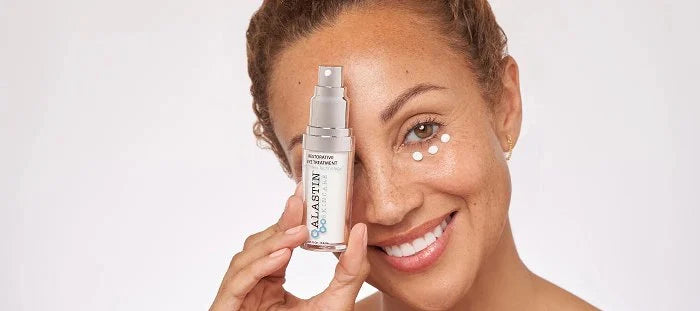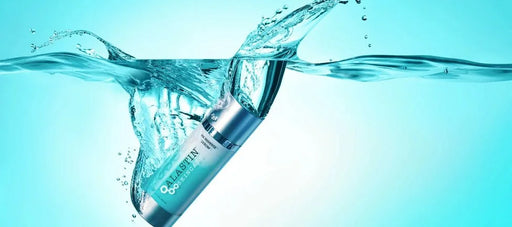You have no items in your bag
Peptides for Skin: How Do They Work and What Are the Benefits?

It seems like there's a hot new skincare technology every day, and sometimes it’s difficult to sort facts from fiction. Peptides are one of those skincare ingredients that have gained a lot of recognition. The good news is that using peptides for your skin does have several benefits that are all backed by science.
This article will answer some of the questions you might have, including:
- What are peptides?
- What do peptides do for your skin?
- How do peptides work?
- What are the best peptides for skin?
Let’s dive into the science of peptides.
What Do Peptides Do For Skin?
Peptides are short-chain amino acids that make up proteins like collagen and elastin. Collagen and elastin are the proteins that promote firm and youthful-looking skin.1
Skin naturally creates collagen and elastin, but the amount of collagen and elastin in your skin decreases as you age. This can lead to wrinkles, a loss of elasticity, and a decrease in brightness.What do peptides do for your skin? Introducing more peptides to your skincare routine is like giving your body the raw materials to build elastin and collagen—it’s essentially supplementing your body’s ability to make more of these proteins. However, not all peptides are created equal
The benefits of peptides for skin that are found in ALASTIN's TriHex Technology® include:
- Reducing the appearance of wrinkles and fine lines
- Increasing skin elasticity and firmness
- Improving skin complexion
If you’re looking for help with anti-aging, peptides might be worth considering. Although peptides are popular for reversing signs of aging skin, there are other lesser-known benefits of peptides in skincare, including:
- Strengthening the skin barrier
- Improving hydration
- Helping to repair skin damage
How Do Peptides Work?
There are various types of peptides2 that you may encounter in skincare products. Knowing how each of them works can help you get the best out of peptides.
Signaling Peptides
If formulated correctly, signaling peptides break through the top layer of your skin to communicate with skin cells to trigger collagen production. They do this by mimicking your skin’s natural wound healing process.
Whenever you are cut or wounded, your skin begins to repair the tissue by accelerating protein production. Signaling peptides effectively trick your skin into thinking there is an injury that needs to be repaired with an influx of new collagen and elastin.
There are many signaling peptides used in skincare, but here is a list of some you may see in your skincare products:
- Palmitoyl Tripeptide-1
- Palmitoyl Hexapeptide-12
- Hexapeptide-11
- Acetyl Tetrapeptide-2
- Acetyl Hexapeptide-38
- Hexapeptide-38
- Palmitoyl Dipeptide-5
Carrier Peptides
Carrier peptides stabilize trace elements like manganese and copper and carry them to your skin. This aids in collagen and elastin production.
Carrier peptides are best known for their role in reducing the effects of skin damage, such as:
- Sun damage
- Thin or compromised skin
- Wounded skin
Enzyme Inhibitor Peptides
Enzyme inhibitor peptides work to inhibit the enzymes that break down your skin’s collagen. The enzymes responsible for this breakdown include:
- Tyrosinase – This enzyme stimulates skin darkening.3
- Matrix metalloproteinases (MMPs) – These enzymes degrade the skin’s proteins and can lead to wrinkling and signs of photoaging (sun damage).4
Enzyme inhibitor peptides can also stimulate the enzyme hyaluronan synthase 2, which activates hyaluronic acid.5
Here are some enzyme inhibitor peptides that may be in your skincare products:
- Trifluoroacetyl Tripeptide-2
- Soybean peptides
- Silk fibroin peptides
- Rice peptides
Neurotransmitter Inhibitor Peptides
The main job of neurotransmitter inhibitor peptides is to inhibit muscle contraction. Your muscles contract because of neurotransmitters that facilitate communication between your neurons and your muscles. Neurotransmitter inhibitor peptides limit this communication.6
This type of peptide is typically used in anti-wrinkle products. Some neurotransmitter inhibitor peptides you might encounter include:
- Acetyl hexapeptide-3
- Palmitoyl Pentapeptide-3
- Pentapeptide-18
- Tripeptide-3
Which Peptides Are Best for Skin?
What are peptides in skincare? Peptides are added to skincare formulas to help improve the health and look of your skin. But in order to know the best peptides for your skin, you should first consider the specific skin concerns you’re targeting.
Wrinkles and Fine Lines
Whether or not peptides can help reduce the appearance of wrinkles largely depends on the type of wrinkles7 you are experiencing.
- Dynamic wrinkles – Dynamic wrinkles are a result of your muscles contracting when you make expressions with your face. They may appear as crow’s feet, smile lines, or frown lines and they go away once your muscles relax.
These wrinkles may be reduced with the use of neurotransmitter inhibitor peptides. Skincare with neurotransmitter inhibitor peptides can function like a mild, topical Botox. They work by limiting the contraction of your muscles and making your skin less able to form dynamic wrinkles.
- Static wrinkles – Unlike dynamic wrinkles, static wrinkles stay on your skin even when your face is relaxed, and they deepen with age. This is because static wrinkles are a result of the skin gradually losing its elasticity. So, over time dynamic wrinkles can become static.
Signaling peptides can help reduce the appearance of static wrinkles and fine lines by communicating with your skin cells to create more collagen, resulting in more elastic skin.8
Peptide Pro Tip: The skin around your eyes is very prone to thinness and wrinkling. You can boost your skin’s collagen and combat wrinkles and crow’s feet with the daily application of one of our best peptide serums, Restorative Eye Treatment with TriHex Technology®. Dr. Kathleen Behr, MD, calls this cream her favorite for its ingredients that target pigmentation, puffiness, wrinkles, and dryness.
Skin Damage
Your skin is your body’s first line of defense against the environment. Because of this, your skin cells lose their strength and become damaged by age, sun exposure, or the occasional injury.
Skin damage may appear as:
- Hyperpigmentation
- Discoloration
- Photodamage (sun damage)
- Wounded skin
- Weakened skin barrier
- Dullness
The following peptides have been shown to address these types of skin damage:
-
Carrier peptides – Carrier peptides are well-researched for their ability to reduce skin damage. Types of carrier peptides include:
- Copper peptide complex (Cu-GHK) has been shown in several studies 9 to improve the overall appearance of skin by reducing hyperpigmentation and photodamage. Its anti-inflammatory and antioxidant properties make it especially effective in promoting wound healing.
- It has also been shown to thicken skin and strengthen the skin’s barrier, further promoting firmness and elasticity.9
- Manganese Tripeptide-1 has been studied as an effective peptide in reducing the effects of photodamage, including hyperpigmentation.10
- Enzyme inhibitor peptides – Enzyme inhibitor peptides work against the enzymes that cause hyperpigmentation and dark spots. This type of peptide can also be effective in targeting dark circles.11
Peptide Pro Tip: The skin on the neck is thin and sometimes suffers much skin damage, but it is often missed by moisturizers and sunscreens. Years of cellular damage can result in severe signs of aging in the neck. For a peptide-packed solution to crepey skin on the neck, try our Restorative Neck Complex with TriHex Technology®.
Dehydrated Skin
A decrease in collagen also decreases skin hydration. The boost in collagen that comes from signaling peptides can also result in a boost in hydration for dehydrated skin.12
Can All Skin Types Use Peptides?
There isn’t any evidence to support that peptides are sensitizing, drying, or acne-causing, so they are generally safe for all skin types. Peptides are safe to use daily.
Where to Find Peptides
You can typically find peptides in serums or moisturizers. However, the quality of the products you use matters. Our medical-grade skincare includes several products with potent concentrations of key peptides that can be purchased through a medical professional or on our website.
TriHex Technology®
At ALASTIN, we know the power of peptides, so we developed TriHex Technology® to maximize rejuvenating benefits. Any of our products with TriHex Technology® will include a blend of active peptides and other peptides that are clinically proven to stimulate three essential skin functions:
- Removal – To make room in the skin for new collagen and elastin, aged and damaged collagen and elastin must be removed first. TriHex Technology® helps to accelerate this essential process.
- Rebuilding – Once the skin has been cleared of damaged collagen and elastin the blend of peptides in TriHex Technology® can stimulate new collagen and elastin production, promoting smoother, stronger, and more elastic skin.
- Replenishing – Finally, regular use of TriHex Technology® supports the continued health of your skin.
TriHex Technology® can be found in these ALASTIN products:
- Restorative Skin Complex TriHex Technology® – Along with TriHex Technology®, Restorative Skin Complex also includes:
- Acetyl Hexapeptide-38 – This is a signaling peptide that triggers your skin cells to store lipids. Lipids are essential to support the strength of the skin barrier and the skin’s ability to hold moisture.13
- Palmitoyl Dipeptide-5 – This signaling peptide helps support the skin’s structure.14
- TransFORM Body Treatment TriHex Technology® – TransFORM Body Treatment is a post-body sculpting treatment formulated to enhance skin-tightening. It includes Hexapeptide-11, a signaling peptide that promotes new collagen and elastin, while also inducing enzymes that remove broken down fat cells.15
- INhance Post-Injection Serum TriHex Technology® – INhance Post-Injection Serum is formulated to accelerate the healing of bruises. With the help of Hexapeptide-38, the peptides in this product stimulate the skin’s natural hyaluronic acid.16
- Restorative Eye Treatment TriHex Technology® – Restorative Eye Treatment promotes the reduction of dark circles with the help of Tetrapeptide-30, an enzyme inhibitor peptide that targets skin discoloration.17
- Restorative Neck Complex TriHex Technology® – Restorative Neck Complex improves the appearance of crepey skin and discoloration with the help of Acetyl Tetrapeptide-2, a signaling peptide known to provide plumping and hydration.18
Follow The Science
ALASTIN utilizes scientifically-proven peptides in several of our products because your skin deserves nothing less than premium, medical-grade skincare.
Our products have also garnered awards for their results by top beauty publications including Shape, InStyle and New Beauty.
If you’re passionate about restoring or simply maintaining your skin, you can count on our products backed by science.
Sources:
- Bauza, E et al. “Collagen-like peptide exhibits a remarkable antiwrinkle effect on the skin when topically applied: in vivo study.” International journal of tissue reactions vol. 26,3-4 (2004): 105-11.
- Schagen, Silke Karin. "Topical peptide treatments with effective anti-aging results." Cosmetics 4.2 (2017): 16.
- Zolghadri, Samaneh, et al A comprehensive review on tyrosinase inhibitors, Journal of Enzyme Inhibition and Medicinal Chemistry, 34:1 (2019), 279-309
- Pittayapruek, Pavida et al. “Role of Matrix Metalloproteinases in Photoaging and Photocarcinogenesis.” International journal of molecular sciences vol. 17,6 868. 2 Jun. 2016, doi:10.3390/ijms17060868
- Schagen, Silke Karin. "Topical peptide treatments with effective anti-aging results." Cosmetics 4.2 (2017): 16.
- Ibid.
- Baugh, William P. “Static Vs. Dynamic Wrinkles". Fullspectrumdermatology.Com, https://www.fullspectrumdermatology.com/blog/2017/12/30/static-vs-dynamic-wrinkles-188837
- Schagen, Silke Karin. "Topical peptide treatments with effective anti-aging results." Cosmetics 4.2 (2017): 16.
- Pickart, Loren, and Anna Margolina. “Regenerative and Protective Actions of the GHK-Cu Peptide in the Light of the New Gene Data.” International journal of molecular sciences vol. 19,7 1987. 7 Jul. 2018, doi:10.3390/ijms19071987
- Hussain, Mussarrat, and David J Goldberg. “Topical manganese peptide in the treatment of photodamaged skin.” Journal of cosmetic and laser therapy : official publication of the European Society for Laser Dermatology vol. 9,4 (2007): 232-6. doi:10.1080/14764170701704668
- Schagen, Silke Karin. "Topical peptide treatments with effective anti-aging results." Cosmetics 4.2 (2017): 16.
- Edgar, S. et al. Effects of collagen-derived bioactive peptides and natural antioxidant compounds on proliferation and matrix protein synthesis by cultured normal human dermal fibroblasts. Sci Rep 8, 10474 (2018). https://doi.org/10.1038/s41598-018-28492-w
- Acetyl Hexapeptide-38". Creative-Peptides.Com, https://www.creative-peptides.com/product/acetyl-hexapeptide-38-item-hb00129-874.html
- "Palmitoyl Dipeptide-5 Diaminobutyloyl Hydroxythreonine Palmitoyl Dipeptide-6 Diaminohydroxybutyrate". Creative-Peptides.Com, https://www.creative-peptides.com/product/palmitoyl-dipeptide-diaminobutyloyl-hydroxythreonine-palmitoyl-dipeptide-diaminohydroxybutyrate-item-cpc1648-159.html
- "Hexapeptide-11". Creative-Peptides.Com, https://www.creative-peptides.com/product/hexapeptide-item-cpc1625-148.html
- "Acetyl Hexapeptide-38". Creative-Peptides.Com, https://www.creative-peptides.com/product/acetyl-hexapeptide-38-item-hb00129-874.html
- "Tetrapeptide-30". Creative-Peptides.Com, https://www.creative-peptides.com/product/tetrapeptide-30-item-hb00130-875.html
- "Acetyl Tetrapeptide-2". Creative-Peptides.Com, https://www.creative-peptides.com/product/acetyl-tetrapeptide-2-item-cpc1665-35087.html













